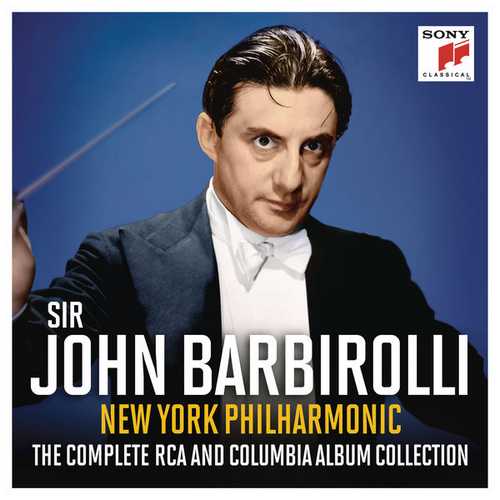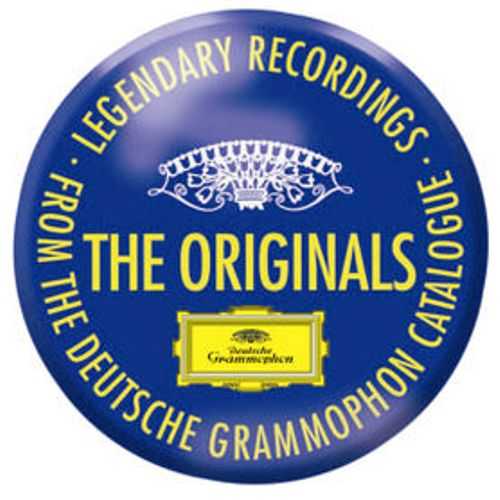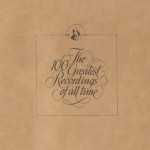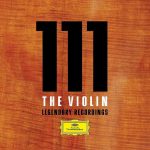
Composer: Johann Sebastian Bach, John Barbirolli, Hector Berlioz, Johannes Brahms, Max Bruch, William Byrd, Claude Achille Debussy, Wolfgang Amadeus Mozart, Henry Purcell, Maurice Ravel, Ottorino Respighi, Nikolay Rimsky-Korsakov, Franz Peter Schubert, Jean Sibelius, Bedrich Smetana, Pyotr Il’yich Tchaikovsky
Performer: Benny Goodman, Robert Casadesus, Nathan Milstein
Orchestra: New York Philharmonic Orchestra
Conductor: Sir John Barbirolli
Number of Discs: 6
Format: FLAC (tracks)
Label: RCA
Catalogue: 19075988382
Release: 2020
Size: 1.31 GB
Recovery: +3%
Scan: cover
CD 01
Purcell: Suite for strings, woodwind and horns
01. 1. Andante maestoso. Allegro (Overture from “The Gordian Knot Untied”)
02. 2. Tempo di menuetto (Minuet from “The Virtuous Wife”)
03. 3. Andantino (Fairest Isle from “King Arthur”)
04. 4. Andantino giocoso (Air from “Abdelazar”)
05. 5. Largo (Lamento from “Dido and Aeneas”)
06. 6. Allegro (Allegro from “King Arthur”, second music)
Debussy: Images for orchestra: II. Ibéria
07. I. Par les rues et par les chemins
08. II. Les Parfums de la nuit
09. III. Le Matin d’un jour de fête
Tchaikovsky: Francesca da Rimini, Op. 32
10. I. Andante lugubre
11. II. Allegro vivo
12. III. Andante cantabile non troppo
13. IV. Allegro vivo – Poco piu mosso
14. Resphighi: Antiche danze et arie per liuto, Suite No. 3
Resphighi: Fontane di Roma
15. I. La fontana di Valle Giulia all’alba
16. II. La fontana del Tritone al mattino
17. III. La fontana di Trevi al meriggio
18. IV. La fontana di Villa Medici al tramonto
CD 02
Schubert: Symphony No. 4 in C minor, D417 ‘Tragic’
01. I. Adagio molto – Allegro vivace
02. II. Andante
03. III. Menuetto – Allegro vivace
04. IV. Allegro
Schubert: 5 Minuets with 6 Trios, D89
05. No. 1, Deutscher Tanz – Trio I – Trio II in C Major
06. No. 2, Deutscher Tanz – Trio I – Trio II in G Major
07. No. 3, Deutscher Tanz – Trio in D Major
08. No. 4, Deutscher Tanz in F Major
09. No. 5, Deutscher Tanz – Trio I – Trio II – Coda in C Major
Brahms: Symphony No. 2 in D major, Op. 73
10. I. Allegro non troppo
11. II. Adagio non troppo – L’istesso tempo, ma grazioso
12. III. Allegretto grazioso – Presto ma non assai – Tempo I
13. IV. Allegro con spirito
CD 03
Sibelius: Symphony No. 1 in E minor, Op. 39
01. I. Andante ma non troppo – Allegro energico
02. II. Andante
03. III. Scherzo. Allegro
04. IV. Finale – Allegro moderato
Sibelius: Symphony No. 2 in D major, Op. 43
05. I. Allegretto
06. II. Tempo andante ma rubato
07. III. Vivacissimo – Lento e suave
08. IV. Finale: Allegro moderato
CD 04
01. Smetana: The Bartered Bride Overture
Rimsky Korsakov: Capriccio espagnol, Op. 34
02. I. Alborada. Vivo e strepitoso
03. II. Variazioni. Andante con moto
04. III. Alborada. Vivo e strepitoso
05. IV. Scena e canto gitano. Allegretto
06. V. Fandango asturiano
07. Ravel: La Valse
08. Berlioz: Le carnaval romain Overture, Op. 9
09. Brahms: Academic Festival Overture, Op. 80
10 .Debussy: Petite Suite: Ballet
11. Debussy: Rhapsody for clarinet & piano (or orchestra), L. 116 ‘Première rapsodie’
12. Bach: Sheep May Safely Graze, from Cantata BWV208
CD 05
Mozart: Clarinet Concerto in A major, K622
01. I. Allegro
02. II. Adagio
03. III. Rondo. Allegro
Mozart: Piano Concerto No. 27 in B flat major, K595
04. I. Allegro
05. II. Larghetto
06. III. Allegro
Mozart: Symphony No. 25 in G minor, K183
07. I. Allegro con brio
08. II. Andante
09 .III. Menuetto – Trio
10. IV. Allegro
CD 06
Bruch: Violin Concerto No. 1 in G minor, Op. 26
01. I. Vorspiel – Allegro moderato
02. II. Adagio
03. III. Finale – Allegro energico
04. Tchaikovsky: Suite No. 3 in G, Op. 55 – Theme & Variations
Byrd: An Elizabethan Suite
05. I. The Earl Of Salisbury’s Pavane
06 .II. The Irish Ho-Hoane
07. III. A Toye
08. IV. Giles Farnaby’s Dreame
09. V. The King’s Hunt
The young John Barbirolli was hardly known in America when the New York Philharmonic-Symphony Orchestra chose him to be Arturo Toscanini’s successor starting in 1937. The 36-year-old Londoner’s first season was a triumph with both players and audiences, and although his years in New York would be increasingly marred by unfair rivalry with Toscanini – lured back to lead a specially created NBC Symphony – and by partisan hostility from two influential critics, Barbirolli’s tenure can now be looked back on as a real success. From 1938 until 1943 Sir John made a series of recordings in New York for American Columbia and RCA Victor which are still essential for a full appreciation of this revered conductor’s career, “performances that are as competitive today as they were when initially released” (Fanfare). Sony Classical is pleased to reissue them in a newly remastered six-CD set.
Among the treasures here are Debussy’s Iberia and Tchaikovsky’s Francesca da Rimini and the first-ever recording of Schubert’s Fourth (“Tragic”) Symphony, together cited by Gramophone as “a demonstration that the Philharmonic-Symphony had few rivals in the world at the time as a recording orchestra … A forceful, high-powered reading [of the symphony] which yet has a Schubertian smile … The crisp attack in the Tchaikovsky, even tauter than in Barbirolli’s superb 1969 HMV New Philharmonia version, is thrillingly caught. The Debussy brings the most vivid sound of all, weighty and full of presence, with castanets and brass leaping out from the speakers. This is a white-hot performance, every bit as exciting as those of Toscanini, and with a moving vein of tenderness in the slow second movement.”
There are several works by Mozart, among them the Clarinet Concerto with Benny Goodman and the Symphony No. 25 and Piano Concerto No. 27 with Robert Casadesus. The Piano Concerto’s opening Allegro “is beautifully shaped with an almost palpable sense of wonder in the music and the pianist is definitely having a ball of time,” said Classical Net. “The final Allegro is also very commendable for its grand sense of pomp and majesty … The exquisite symphony also receives wonderful attention and care from Barbirolli and the NYPSO. Here one can sense the conductor’s love for Mozart’s inspired melodies … Benny Goodman is a characterful interpreter of the Clarinet Concerto.”
“The generous flavor of Barbirolli’s Brahms comes through in the Academic Festival Overture and the Second Symphony,” wrote Audiophile Audition’s reviewer. “The Overture is rife with ceremonial grandeur and jolly spirits. The D major Symphony has a debonair airiness and bucolic relaxation about it.” And Sibelius’s First Symphony” should delight fans of Barbirolli’s 1960s complete traversal of the symphonies … The conductor’s warmth, vision, and emotional urgency has lost none of its appeal in the more than half century that has passed” (Fanfare).
Nathan Milstein is playing the Bruch Concerto with “the Philharmonic-Symphony in tremendous form,” exclaimed MusicWeb International’s critic. “Barbirolli opens powerfully and Milstein responds in kind; not over emoted and with vibrato perfectly scaled to the demands of the music. He is really quite withdrawn and introspective in the Adagio, powerfully so indeed, and Barbirolli brings out the horn harmonies in a way that seems to reveal them for the first time. There is romantic fervour but also passagework clarity and digital cleanliness in the finale … a model of concerto accompaniment and creative collaboration.”



